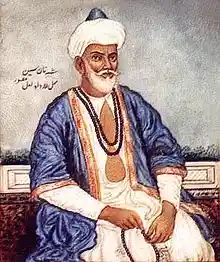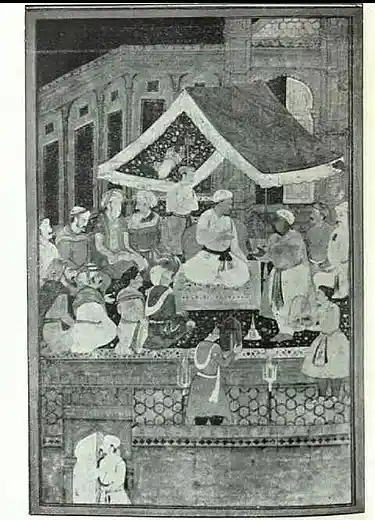Faizi: The Perfect Blend Of Literature And Mathematics.
After listening to Abul Fazal, Akbar gets quite tense about his son Salim. He is worried about Salim, and that maybe there are chances he could also fall into depression. After all, if a brilliant mind like Abul Fazal could be a victim of this, aren't there any chances of his son falling into the web?

Court Poet Of Akbar, Faizi; Image Source: Medium.
While having a round all around his city, Akbar saw his sons Salim, Murad, and Daniyal with Faizi in the market. He couldn't understand what was going on and how come the princes were outside the palace without his permission, and that too, when they all should be studying.
He had noticed before that at the time of the classes, they were never sitting in one place. Ascending the throne at a very young age, he couldn't get a formal education, but he wanted his sons to be scholars. As a result, this matter bothered Akbar on a personal level, and he decided to ask Faizi about it only in court.
"Faizi miyaan, I am in some dilemma and I think no one else can solve this," said Akbar, with a little bit of confusion.
"Ji Huzur farmaaiye. I will try my best to solve your dilemma, "said Faizi with the utmost respect.
"Yesterday, I saw my three sons with you at the market during study time, and I doubt they were learning anything or not," said Akbar, who expressed concern for his sons' well-being.
"I sincerely apologise to you, Jahanpahan, for causing you this unnecessary tension, but I would like to tell you about this method of teaching. After hearing me out, you can decide for yourself. " Faizi suggested.
With this, we dived deep into the past of Abu al-Faiz ibn Mubarak, who goes by the pen name Faizi. Faizi was none other than Abul Fazal’s elder brother, who is well-known throughout the world for his book Akbar Nama. Unlike his brother, Faizi was a poet who was also romantic in nature. It could be reflected in one of his translations, which has similar features to Persian and Arabic romances.
This famous navratna of Akbar’s court was born to Shaik Mubarak in Agra. Being born into a high scholar family, there was no doubt that he would not be highly educated. His father was the reason for their high education. He was homeschooled in the conventional method of teaching and was okay with that.
His brilliant mind drew Akbar to him, and he was later appointed to teach his three sons mathematics. As a result, he was appointed to Akbar's Navratna. It is weird to hear that a poet could teach mathematics, but he was a genius.
Faizi excelled in every subject, but he was not happy with the conventional method of teaching. He was a very loving brother and loved Abul Fazal dearly. Yet this one incident changed his perspective towards the conventional method of teaching. No doubt, Abul Fazal was undeniably gifted, but he fell into depression because of the traditional method of teaching. This led him to find a new way to teach the students in a more friendly manner and in more vibrant surroundings. So Faizi ended up teaching his students by indulging them in various activities and letting their minds grow in every aspect.
"Jahanpanah, I feel that now you will be satisfied with my method," said Faizi, bowing in front of him.
"I am not only satisfied with you, Faizi Miyan, but highly impressed with your methods. And I cannot find enough words to say for the love you have for your brother." Akbar said with delight.
Along with writing ghazals and poems, Faizi translated many texts from Sanskrit to Persian. One of those is the famous Indian romantic epic Nal-Damyanti, and the other one was Lilavati, which was a book on mathematics.
One of the most famous epics of all time, the Mahabharata, was also translated into Persian by both Faizi and Abdal-Qadir Badaunin, which is called the Razmnameh. He was an astounding writer and a translator as well, with the proper knowledge of the language, and he was conscious of his emotions and expressiveness in his writings.
Akbar was filled with gratitude for Faizi, as he not only gave his sons an excellent style of teaching but also considered their positive mental state and well-being.

The sufi poet showing his work to Akbar; Image Source: Wikipedia


